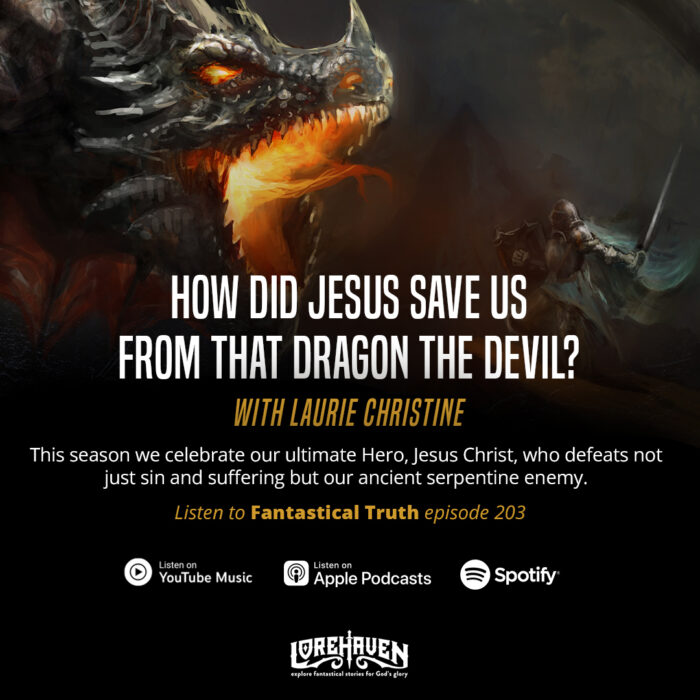Presenting Truth In Fiction
Stories are powerful tools for presenting the truth.
As our mindset has become increasingly postmodern, a problem has arisen that undermines this valuable aspect of storytelling. Truth is no longer a defined standard, a rock-solid starting point for interpreting reality.
 Instead, society demands a relativistic frame of mind. Truth has become subjective, based on personal feelings, preferences, and opinions. This is dangerous when it comes to telling stories in any medium.
Instead, society demands a relativistic frame of mind. Truth has become subjective, based on personal feelings, preferences, and opinions. This is dangerous when it comes to telling stories in any medium.
The cultural river has picked up and swept stories far downstream, farther from any acceptance of Truth (capital T intended) and toward a land where my truth is as valid as your truth. My way of viewing the world is no more right or wrong than yours.
What practical impact does this have on stories?
Audiences approach a movie or book with relativism rooted firmly in their thinking, meaning no matter the intended theme presented throughout the course of the narrative, the interpretation is ultimately up to the individual.
Let’s take Aslan’s death in place of Edmund as an example. The Christian sees the beautiful message woven into that act of self-sacrifice, which points to Christ’s sacrifice for us. To an unbeliever, however, who lacks the guiding star of Truth, the event is merely done because Aslan is good, and that’s what good people (or lions) do for their friends.
Which is true but removes the deeper meaning.
The two popular approaches are mainstream and Christian. After looking at each of these, let’s explore how we as Christian creatives can best present Truth.
The Mainstream Approach
It amuses me when I see secular stories probing into themes such as sacrifice, loyalty, love, and redemption. They can’t help it. All stories are branches shooting off the trunk of the Great Story spoken of at the end of The Last Battle.
Granted, their conclusions are skewed, but as writers well know, nothing is completely unique and original.
Secular movies and books have no qualms about asking hard questions and exploring weighty themes. However, due to the postmodern grayness of today’s thinking, these themes are unmoored from the anchor of Truth and run the risk of losing their potency.
 In Mockingjay, we’re left with an empty feeling bordering on despair (kudos to the movie for an ending that contained a glimmer of hope).
In Mockingjay, we’re left with an empty feeling bordering on despair (kudos to the movie for an ending that contained a glimmer of hope).
Inception boldly delves into the murky waters of the meaning of reality. The answer it reaches? According to Christopher Nolan:
“The way the end of that film worked, Leonardo DiCaprio’s character Cobb—he was off with his kids, he was in his own subjective reality. He didn’t really care anymore, and that makes a statement: perhaps, all levels of reality are valid.” (emphasis mine)
Despite themes that lean toward Christian principles, secular stories fall short, built as they are on the shaky grounds of societal acceptance. Like a reflection, they hint at the reality without truly presenting it.
The Christian Approach
On the Christian side, we have stories that do equal damage. The message becomes the central pillar around which everything revolves—often to the detriment of the actual plot and character arcs.
To paraphrase Eomer in Two Towers, “I don’t doubt the good intentions of Christian authors and filmmakers, only the execution of their stories.” This isn’t intended to be an article bashing Christian storytelling or complaining about the lack of diverse, worthwhile entertainment in the Christian industry. We’ve ridden that carousel in circles for years.
However, the bunny and flowers tactic has problems. Forget the obsession with a rosy-colored unreality, the insistence on being clean (whatever that means), or any other elements that make your pet peeve gauge swing into the red.
Christian fiction is too forceful. In seeking to present the Truth, such stories are too eager to use the two-by-four approach—running up and down the street smacking people with God, miracles, conversion experiences, moral demands. The list goes on.
At the end of the day, how we present Truth is just as important as actually doing it justice in the first place.
The Ideal Approach
As Christian creatives, which approach is best for us?
I suggest a combination of both. Story trumps message, but like a solid foundation, a compelling message is what upholds the story.
The message should arise from and flow out of the author’s worldview, a river that waters the garden plot of the story instead of a deluge that drowns everything because if we don’t put God and a “Christian” theme in every chapter, we’re somehow failing.
Think Tolkien and Lewis, for whom I have great respect because of their ability to present Truth in a potent and skillful way. Their stories resonated with Truth without throwing it in your face. The foundation was there, hidden, yet vital to the story. This is the type of excellence we should strive for.
Does that mean we can’t use obvious portrayals of God in our stories? No.
Does it mean we should carefully consider what Christian elements we include, how they fit within the framework of the story, and what they contribute? Yes.
Because what’s more powerful than a riveting tale whose tapestry is woven with the golden threads of Truth?
What do you think is the best way to present Truth through the vehicle of storytelling?



































Yes, I agree with you. There is nothing “wrong” with having Christian elements in your book. But they shouldn’t be there just for the sake of being there. They have to have a reason for being there, the reason being driven by the story. In other words, what is driving your story? Is it meant to be thinly veiled evangelism, or is it a story about real people dealing with real events? (of course, “real” in the speculative fiction world has a broad meaning :D).
This is why we have started identifying the spiritual level, both good and bad, in our reviews of Christian speculative fiction. What you just described is level-three, or Christian religious fiction. We also have a level-four for redemptive fiction, and a level-five for spirit-filled fiction.
In all cases, we need and expect excellent stories where characters just naturally live out their lives in the story. Any Truth exposed simply happens naturally, in passing. For example, in my life I talk to the Lord privately all the time throughout every day. I hear from Him regularly also. His guidance is a natural and essential part of my life. In my technothriller, I have characters who live at that level also. They get insights which are normal for spirit-filled people, but almost incomprehensible to non-believers.
But the non-believing warriors learn to trust their insights. One of my warriors also uses enemy power [astral projection]. It’s treated in the same manner. Here insights are also relied upon by her team. The different spiritual forces, good or evil, are shown clearly without ever discussing or preaching about them. But in the reviews of the books, I’ve had Christian reviewers question me strongly about including the enemy spiritual activity. (The astral-projecting team leader leads one of the teams for the good guys.)
The same is true of redemption. If a person comes to know the Lord, in a natural manner, and is born from above. We don’t have to talk about it. All we need to do is show how his or her life is transformed.
Bible thumpers are completely contra-productive. Preachers are an annoyance outside of a religious setting or a spiritual meeting. All we need to do is get real.
Zach, a thought-provoking article (we must be drinking from the same water or something, since we both wrote about Truth this week). I mostly agree, but I admit, this one line is difficult for me: “Story trumps message.”
I believe I understand what you’re saying, especially when you went on to say that the message is the foundation that holds the story up. In that regard, I would say the story serves the message. Story shows the truth, but we need to have a truth we want to show.
I think too many Christian writers have bought into the idea that our worldview will naturally seep into a story. So just because we’re Christians, somehow, without trying to, we’ll show some Christian truth in our story. Well, OK, that’s not impossible, but I don’t think it’s a “best practice” approach to writing.
Do we say, well, because I’m a human, I don’t really need to work at crafting my characters. They will naturally take on the qualities of a real person because I’m a real person. Again, possibly some writers think that way, but it’s not the best practice.
So my point is simply this: we work hard to develop a world, craft characters, and structure the plot. Why wouldn’t we work equally hard to embed our theme into the story so that it comes through with power?
Becky
I have to agree with Becky Miller on this one. When I hear phrases like “bible thumpers” and “story trumps message” it smacks to me of let’s just do whatever we want, it’s okay, since we’re Christians that makes whatever we write Christian too. Wrong. There is a great spirit of lawlessness in the world, and it touches this community too. Zachary is right about relativism permeating the world, but lawlessness is beginning to permeate us too as the world draws ever closer to its end, just like God says it will. Story doesn’t trump message, not when there is little to nothing that can be recognized as biblical truth in what we write. This is growing. The question is not and never should be “What if?” but “What do the scripture say?” We cannot for example create a polytheistic universe and honor Him Who said I AM YHWH. Nor can we create a godless sci-fi universe or worse, call the “Force” God. Things like this can never be what if, because the Word of God tells us they won’t be. Story and message are equally important and need to be balanced, but above all must never contradict the Truth as God tells us it is in His everlasting, changeless Word. This may serve ourselves, but it doesn’t serve the God of all Truth.
I completely agree, and yet I think it’s fine if a writer wants to create a world in which a segment of society or a particular people group are polytheistic or worship a false god. That’s simply realistic. But the other way—a world in which polytheism is the standard and only way people relate spiritually-p—would present a lie as if it were an actual possibility.
Becky
“Story trumps message, but like a solid foundation, a compelling message is what upholds the story.” Yes! I got really frustrated years ago when I felt like my stories were becoming formulaically Christian. So I decided to focus on story. Lo and behold, the truth kept showing up in the story because you can’t write a meaningful story without real Meaning showing up. But this time it was natural and not forced.
We Christian writers can get waaaay too stuck in our own heads over this. Illustrative story:
I was describing the dilemma of how-do-I-include-truth-without-bashing-people-over-the-head-with-it to my sister and she started laughing. “You’re overthinking it! You’re trying to stuff all the right answers into your story. The main thing is to get them to ask the right QUESTIONS, and then the answers that they seek out will stay with them forever.” (I tell ya, she may be five years my junior, but this girl has the perspective of a 90-year-old.)